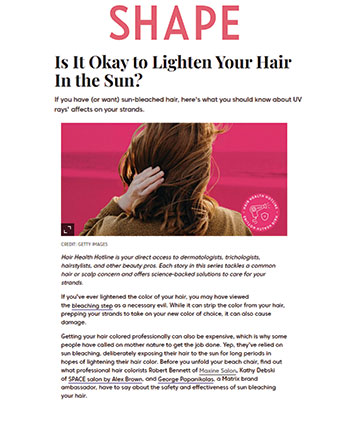Shape June 16, 2022
SHAPE
Beauty
Is It Okay to Lighten Your Hair In the Sun?
Hair Health Hotline is your direct access to dermatologists, trichologists, hairstylists, and other beauty pros. Each story in this series tackles a common hair or scalp concern and offers science-backed solutions to care for your strands.
If you've ever lightened the color of your hair, you may have viewed the bleaching step as a necessary evil. While it can strip the color from your hair, prepping your strands to take on your new color of choice, it can also cause damage.
Getting your hair colored professionally can also be expensive, which is why some people have called on mother nature to get the job done. Yep, they've relied on sun bleaching, deliberately exposing their hair to the sun for long periods in hopes of lightening their hair color. Before you unfold your beach chair, find out what professional hair colorists Robert Bennett of Maxine Salon, Kathy Debski of SPACE salon by Alex Brown, and George Papanikolas, a Matrix brand ambassador, have to say about the safety and effectiveness of sun bleaching your hair.
Q: I've heard if you sit out in the sun it can lighten your hair color. Does this actually work and is it safe?
A: Your hair may become lighter in the sun if you spend hours outside, but just because it works doesn't mean it's a better alternative. Lightening your hair in the sun can create issues for your hair and scalp.
Why Does the Sun Lighten Hair?
Quick science lesson: Your hair can become lighter from sun exposure due to the same reaction that bleach triggers during a hair color treatment. It's a chemical reaction called oxidation, which occurs when a substance comes in contact with oxygen, explains Bennett. "The sun's ultraviolet (UV) rays oxidize the hair," he says. "In other words, the sun bleaches out the melanin in the hair," he says. (ICYDK, melanin is the natural pigment that's responsible for the color of your hair, eye, and skin.) When the hair becomes oxidized and oxygen is introduced to the strands due to UV exposure, it causes the melanin molecules to become colorless, explains Debski.
Lightening hair in the sun typically works better on lighter hair colors, such as blonde or "bronde" (a cross between brown and blonde hair), since those hues already have less melanin present, according to Papanikolas. Generally speaking, though, the process of sun bleaching is slow, gradual, and "requires a lot of hours in the sun," he says. You also have no control over how long it will take to reach your desired shade, which is why Debski calls the process "unpredictable" and doesn't recommend trying it.
Before using the sun's rays to lighten their hair, some people will apply lemon juice to their hair or hair products with lemon juice in them (such as Sun-In) in hopes of more noticeable or faster results, which is effective but potentially more damaging. "The citric acid in lemon juice is a natural bleaching agent," says Bennett. "It's easy to apply, and it will oxidize the melanin in your hair [along] with the sun's UV rays."
The Impacts of Lightening Your Hair with Sun Exposure
While it's effective, lightening your hair with the sun is best avoided because of its effects on hair and scalp health, according to experts. "[Lightening hair in the sun] causes dryness because [the UV rays] are breaking down the protein compounds (aka keratin) in the hair," says Debski. A lack of keratin can lead to brittle, weak strands, says Papanikolas.
Additionally, making your hair lighter from sun exposure can harm your scalp. "Sun bleaching can cause your scalp to dry [up and] flake from the acid in the lemon [and] the UV rays from the sun," says Bennett. Not to mention, any time spent directly in the sun without protection can increase your chances of getting skin cancer.
While the traditional process of hair bleaching and sun bleaching both use oxidation to lighten hair, with the former, you're usually in the hands of a professional. When getting your hair professionally bleached, your hair colorist can adjust and monitor the amount of bleach used to give you your desired hair color. Your colorist can also provide in-salon treatments, such as treatments that are only sold to salons, which can help repair and protect your hair and scalp from the chemicals used in bleach.
That's why this method of bleaching is a hard pass, according to these experts. "The sun is not your friend, especially if you plan to be in it all day," says Bennett. "It will dry out the hair and scalp, so I do not consider it safe," adds Debski.
The Final Word On Sun Bleaching Your Hair
Rather than soaking up the sun's rays in hopes of lightening your hair, ideally you'll take measures to shield your strands. "I always recommend wearing hats for protection," says Debski. You can also incorporate scalp and hair sunscreens into your hair-care routine, which, yes, are a thing.
Moisturizing your hair after sun exposure is also essential, says Papanikolas. Bennett agrees. "After being in the sun, use a moisturizing shampoo and conditioner to [counteract] the dryness that may occur from the sun," he says. (Related: The Best Conditioners for Dry Hair)
So, there you have it. If you're thinking about going lighter this summer, visiting a professional will be worth the money and effort.
Have a hair health question you want answered? Send your Q to hairhotline@shape.com for a chance to have it featured in a future installment of Hair Health Hotline.

